
Guests
- Scott PetersonMiddle East correspondent for The Christian Science Monitor and the paper’s Istanbul bureau chief. He joins us on the line from Istanbul.
- Laura RozenNational security correspondent for Mother Jones and contributor to The Washington Monthly and National Journal. She has been closely following this story and recently profiled the Kurdistan regional government’s representative in Washington, Qubad Talabani, for The Washington Monthly. In May, she wrote an article for the National Journal, “Iraq’s Potential New Front.” She maintains the blog “War and Piece.”
Links
Following weeks of a Turkish military build-up along Iraq’s northern borders, the Iraqi government formally accused Turkey of bombing northern parts of the country. Turkey in turn asserted that the Kurdish Workers Party is being indirectly armed by the U.S. military. With increasing talk of a Turkish invasion, we go to Turkey to speak with chief Christian Science Monitor Middle East correspondent Scott Peterson. We’re also joined in Washington by Laura Rozen, national security correspondent for Mother Jones. [includes rush transcript]
Transcript
JUAN GONZALEZ: While lawmakers on Capitol Hill debate the war in Iraq and the so-called troop surge in Baghdad, tensions along the Iraqi-Turkish border are running high. News reports indicate that Kurdish-dominated northern Iraq could soon explode into a new front in the war. Over the past few weeks, the Turkish army has been building up thousands of troops along Iraq’s northern border. It accuses the Kurdish regime of harboring Kurdish militant groups it says are responsible for attacks inside Turkey.
On Wednesday, the Iraqi government formally accused Turkey of bombing northern parts of the country. The Turkish ambassador to the United States in turn asserted that the Kurdish Workers Party, or the PKK, was being indirectly armed by the U.S. military. He accused the U.S. and Iraqi governments of “not doing enough” to prevent PKK attacks against Turkey, paving the way for Turkey to take military action.
AMY GOODMAN: Iraqi and Kurdish leaders suggest a Turkish invasion into northern Iraq could happen very soon. They say the Turkish army is just waiting for the results of this Sunday’s parliamentary election and hoping to fully consolidate its power before it launches an attack.
We go now to Turkey to speak with Scott Peterson, chief Middle East correspondent for The Christian Science Monitor, the paper’s Istanbul bureau chief. He joins us now. Welcome to Democracy Now!
SCOTT PETERSON: Thank you.
AMY GOODMAN: It’s good to have you with us. Well, can you talk both about the elections and what is happening along the border with northern Iraq, with Kurdistan?
SCOTT PETERSON: Well, let’s start along the border. I mean, at the moment, there really has been a large surge of Turkish troops over the last few weeks. Some analysts say that this is part of the normal kind of measure that is taken by the Turkish military to counter the annual spring offensive from the PKK, on one hand. Others say that numbers are larger this year because it is more likely that the Turkish military is going to cross into northern Iraq to deal with attacks that they see is emanating and coming from northern Iraq.
But I think that in terms of what the Turkish military is going to do or is willing to do, there is an awful lot of politics involved at the moment. I mean, the government, of course, is up for election just this coming Sunday, and they have been at loggerheads with the military over the last few years over a number of issues, in part because the ruling party is an Islamist-rooted party, and so they have had their own issues. So analysts here are thinking that it’s not so clear that the Turkish military wants to go into northern Iraq as much as they went to pressure or even embarrass sometimes this ruling government.
Turning toward the elections, we do have a vote coming up on Sunday for the parliamentary elections. What’s likely to happen is that the ruling Islamist party is going to lose its two-thirds majority. At the moment what they are hoping to gain is an absolute majority of 51 percent of the seats in Parliament. Almost certainly there will be new parties in Parliament, which will make things a little bit more democratic. But, of course, the primary issues seem to be what really defines modern Turkey, and that is the difference between those who are interested in the more Islamic path for Turkey and those who adhere to its secular tradition, which, of course, was set up by Mustafa Kemal Ataturk when he created the Turkish state in 1923.
JUAN GONZALEZ: Scott Peterson, this allegation by Turkey that the United States is indirectly assisting the PKK, is there any evidence of that, given the fact, obviously, that the — isn’t the PKK really a more, historically more of a left-wing insurgency, a secular insurgency that would be unlikely to be supported by the United States?
SCOTT PETERSON: Well, the PKK really disappeared as an organization for the past five or six years. In 1999, its leader, Abdullah Ocalan, was captured by the Turks, in fact. And in his first appearance in court, Ochalan said that the PKK had made a number of mistakes during the 15-year separatist war, that they should now try and work within the state and with state structures to find recognition of Kurdish rights and recognition of Kurdish culture. And he also said that they’re no longer fighting for a separate Kurdish state. So those were all quite important changes that really kind of took the wind out of the PKK sails for many years.
What we’ve seen in the last year or two now is a surge of PKK activity in terms of attacks — certainly in terms of attacks that the government attributes to the PKK, and those are both in Ankara, others also in Istanbul, some targeting civilians and many targeting also soldiers, especially in Kurdish areas in southeast Turkey.
Now, of course, the issue of who is supporting the PKK is a very thorny one, because, of course, the PKK remains on the list of terrorist groups, as officially designated by the U.S. State Department. The United States has identified and chosen a special envoy specifically for countering the PKK. That’s the title of Joe Ralston, General Joe Ralston. And so — and, of course, the U.S. denies that it is giving any support to the PKK, but from the Turkish point of view they say, Wait a minute, there are American forces who control all of Iraq, and therefore since the PKK has bases in northern Iraq, that means that by definition there are — you know, that the U.S. is somehow involved, if nothing else, in turning a blind eye. And you’ve also got apparently safe haven given to the PKK by Iraqi Kurds in northern Iraq.
And the reason for these latest accusations or allegations is, just in the past 10 days or so there was a press conference that was purported to be from four PKK members who had fled northern Iraq. They appeared in Ankara at a press conference wearing masks and saying, we have just fled, that PKK militants are leaving their bases, expecting a Turkish invasion, and that also they had witnessed, they say, American troops actually offloading weapons at PKK bases for the PKK. And I have spoken to senior Turkish police officers who feel that the entire story is concocted, and I’m sure that would be the American view, too, but, again, it really does raise a lot of popular questions in the minds of Turks.
AMY GOODMAN: We’re talking to Scott Peterson, Middle East correspondent for The Christian Science Monitor. He’s speaking to us from Istanbul in Turkey. We’ll come back to him, and we’ll be joined by Laura Rozen, who’s been writing some very interesting pieces in Mother Jones about the situation in Kurdistan and Turkey. Stay with us.
[break]
AMY GOODMAN: Scott Peterson is on the line with us from Istanbul in Turkey, with The Christian Science Monitor. We’re also joined by Laura Rozen, the national security correspondent for Mother Jones, contributor to The Washington Monthly and National Journal. She’s been closely following this story and recently profiled the Kurdistan regional government’s representative in Washington, Qubad Talabani, for The Washington Monthly. In May, she wrote an article for the National Journal. It’s called “Iraq’s Potential New Front.” Laura Rozen joins us now from Washington, D.C. What is your assessment of what’s happening right now and your recent piece, “Kurdistan’s Covert Back-Channels”?
LAURA ROZEN: Good morning. I think the state of play is essentially that the U.S. is overwhelmed with other problems in Iraq. And for Washington, the PKK problem in northern Iraq is not a top priority. And for Turkey, it is a top priority, perhaps the top priority. And for Iraqi Kurdish leaders, including, I think, their representative here in Washington, Qubad Talabani, they see the PKK as a kind of leverage that they could trade to get something else perhaps from Washington, their Iraqi compatriots, and their neighbors, like Turkey.
And one thing in particular the Iraqi Kurds are interested in is a referendum on the status of the city of Kirkuk before the end of the year, which is in the constitution that everyone agreed on, but which the U.S. is hoping to kind of kick the can down the road, because there’s been a lot of violence in Kirkuk, and the possibility of the city coming under Kurdish control is fiercely opposed by Iraqi Arabs and the Turks.
JUAN GONZALEZ: Laura Rozen, you’ve also written about a lot of the intrigue that occurs in Kurdistan, especially about a guy by the name of Shlomi Michaels, an Israeli, and the involvement of possible Israeli intelligence folks in that area. Could you talk about that?
LAURA ROZEN: Yes. I mean, one of the things that has caused, I think, the Ankara — the Turkish government to be a bit paranoid is they see a lot of foreign involvement in Iraqi Kurdistan, and they fear, I think, that Western powers, including perhaps Washington, perhaps Israel, perhaps some of the Europeans, may support an independent Kurdistan.
And one of the things that caught their attention was the fact that there have been about 50 Israelis who have gone into northern Iraq under the guise of being agricultural workers. Many of them were former security officials in the Israeli government. They’re working, in fact, on development projects and security training with the Kurdish Barzani clan.
But one of the interesting things to note is that Turkey is the biggest foreign investor in Iraqi Kurdistan. And one of the things that gives General Ralston, the U.S. special envoy on the PKK issue, I think, some hope that the U.S., Turkey and the Iraqi Kurds can come to some resolution of the PKK issue is that under the surface of all these tensions, there is a lot of economic cooperation among all the parties and some sense that their futures mutually depend on each other.
JUAN GONZALEZ: And you’ve also written about the involvement of high-powered lobbyists, Republican lobbyists, in Kurdistan and representing officials here. Talk about that a little bit.
LAURA ROZEN: Yeah. I mean, the Iraqi Kurds have gotten really smart. They’ve learned from other ethnic minorities in the United States that nothing sharpens your argument in Washington more than a few million dollars worth of high-powered lobbying assistance. So, they’ve hired — you know, they spent several million dollars the past few years, the Iraqi Kurds have, and they have a very sophisticated operation here. They’re running an advertising campaign now, I think called “The Other Iraq,” that, you know, shows that Iraqi Kurdistan presents many of the things that America was hoping to find in a post-Saddam Iraq, but hasn’t: security, more equality, things like that, economic development.
AMY GOODMAN: Laura Rozen, what support does PKK have among the Kurds?
LAURA ROZEN: I think there’s some. I mean, Iraqi Kurds say they have some emotional attachment to the PKK, but I don’t think that is the real obstacle to getting the Iraqi Kurds to assist the Turks and the Americans in finding a resolution to the PKK problem. I think the Iraqi Kurds are trying to find all the leverage they can in this complicated situation to seek the things that they would like to get from the Americans over the next few years.
JUAN GONZALEZ: And, of course, Iran also has a Kurdish minority. Is there any indication of continuing unrest in the Kurdish sections of Iran?
LAURA ROZEN: I think there is some violence by Iranian Kurds against the Tehran regime and also by other ethnic minorities in Iran, including the Baluch, the Azeris. There’s a lot of rumor and suspicion, including from the Iranian regime, that this is U.S.-backed. It’s hard to find evidence of the U.S. supporting these groups. I asked General Ralston a couple months ago, and he said, to his knowledge, the U.S. is not giving any support to the PKK. He said he’s got that from the highest levels. But he was careful in answering my question to not mention an Iranian offshoot of the PKK called the PJAK. He kept saying, “Well, the U.S. is not supporting the PKK.” It’s not clear to me that the U.S. is not in some way perhaps supporting this other Iranian cousin of the PKK.
AMY GOODMAN: I want to go back to Scott Peterson in Istanbul, Christian Science Monitor reporter. These elections that are coming up, the significance of them, and could you see an all-out attack by Turkey on northern Iraq, on Kurdistan?
SCOTT PETERSON: Well, I don’t envision it, myself, and then the analysts who I’ve spoken to basically say that this is, at the moment, a lot of hot air coming from the Turkish military, really for political reasons to put the government, current government, in a spot, you know, perhaps to indicate that the military is ready to go, but that the government is weak in fighting terrorism. That’s how they put it.
And, you know, the lessons learned here from the military are that, you know, they’ve made more than two dozen forays into northern Iraq over the past 20 years. None of those wiped out the PKK. Many of them occurred during Saddam’s time — most of them, in fact, occurred during Saddam’s time and really were the result of a treaty that had been signed quite sometime before that. And so, Turkey was taking advantage of that. But, really, in the end, they didn’t wipe out the PKK bases. I mean, even now there are some Turkish troops in northern Iraq, and even now there are still some kind of minor hot-pursuit operations that take place and regular shelling, although often, you know, cross-border shelling, which really does seem to just kind of knock out orchards and things like that more than actual bases. So it’s hard to know how effective those things are. But analysts who I’ve spoken to are perfectly aware that the Turkish military did not achieve an awful lot by crossing into the border — crossing into northern Iraq.
And these days, of course, the situation is completely different, because instead of dealing with an area that nominally has been part of Saddam Hussein’s Iraq, you potentially could be facing off with American troops on the other side and, of course, a much, much stronger Iraqi Kurdish operation just south of the border, as well. And I think that Laura is correct in her assessment that the Iraqi Kurds are using the PKK to a degree as leverage against Turkey.
I mean, you know, these types of allowances and arrangements change, shift, fluctuate over the years all the time. I mean, it wasn’t so many years ago, in fact, when Barzani’s Iraqi Kurds, the KDP, their militants were going through on behalf of the Turkish military hunting down PKK militants. They helped actually end that problem. Of course, now things have shifted, but these kind of things are really — you know, people are looking — people who are making decisions here are looking for opportunities and just playing the card of the day. So we will see what happens. But I really don’t think we’re going to see an imminent cross-border operation, because they know it’s not going to solve the problem, and once you do send over 40,000 troops in northern Iraq and there’s still bombs in Ankara or Istanbul, what will you do then?
JUAN GONZALEZ: And, Scott, I’d like to ask you, something you mentioned earlier, the upcoming elections. There was a lot of attention months ago to the growing conflict between the secularists and the Islamists within Turkey. How is that playing out now, as you’re heading toward these elections?
SCOTT PETERSON: Well, I think that that is still the primary defining element, if you will, of these elections. I mean, you know, and kind of the big bear that’s just over the horizon here is the military. In fact, even more than what they do regarding the PKK is what they will do regarding a strengthening of the electoral hand of the ruling AK party, which has Islamist roots. I mean, of course, the reason why we saw those huge secular demonstrations a couple of months ago is because the military had a very severe and abrupt reaction when the AK party put up one of its own, Abdullah Gul, the foreign minister, as a presidential candidate. And basically, the military reacted and said, “Do not forget that we’re the safeguards of secularism in Turkey and that we will act when we deem it’s necessary.”
Of course, the Turkish military in the last 40 years, 50 years, has conducted four separate coups. Sometimes they really were military coups. And then the most recent one in 1997 basically forced from power the progenitor of the ruling AK party today. There was a much radical party called the Welfare Party, and in those days, you know, all it took was tanks being rolled into a village not too far from Ankara to cause that party to basically collapse and be outlawed.
Today, the military is watching very carefully, and what’s remarkable here is that you do get a polarization among people. I mean, you get secular people who say, you know, that if we don’t stop this now, what we’re going to see is Turkey turning into another Iran. I mean, they really use those two words in the same breath, which for anyone who lives here and also for anyone who knows Iran seems to be extremely unlikely and remarkable. And I think that we have seen a much more mature Islamist party that recognizes where the limits are. They’re pushing those limits all the time, but that they are doing it in a way that the way they push, you know, the pro-business and pro-economic policies over an Islamist agenda, that’s put some minds at rest, at least.
AMY GOODMAN: Laura Rozen, can you tell us who Qubad Talabani is?
LAURA ROZEN: Qubad Talabani is the almost-30-year-old son of the current Iraqi President Jalal Talabani, who’s the longtime kind of Iraqi peshmurga leader turned statesman. Qubad was raised in exile in the United Kingdom by his grandparents, his maternal grandparents. He has a British accent. He’s very soft-spoken and refined. He is married to the former State Department Iraq hand, and he’s — and it’s a sign of how much he’s learned the ways, I think, of Washington. He runs a small office down the street from here near the White House that seeks to get the White House and the Pentagon and the State Department to support the Iraqi Kurdish side of things.
AMY GOODMAN: And Iran, the division right now within the Bush administration around attacking Iran, who’s on what side, Laura?
LAURA ROZEN: The State Department really is trying to lead, I think, a tough diplomacy route similar to the one that Chris Hill used to achieve a diplomatic non-military solution with North Korea recently. And so, Secretary of State Rice has appointed Under Secretary of State Nick Burns, a former Clinton-era diplomat and ambassador to Greece, to take the lead internationally on trying to create an international coalition to use diplomacy and economic sanctions and the offer of economic carrots to Iran to agree to suspend its uranium enrichment. And I think the State Department is currently driving the thrust of the U.S.-Iran policy at the moment. It hasn’t always been that way. It may not stay that way.
I know there are a lot of reports that, in particular, the office of Vice President Cheney has people who are very skeptical that there could ever be a diplomatic solution with this Iranian regime and that they may find an opportunity in the coming year, if the negotiations that Burns is trying to lead don’t succeed, to seize control of the policy again and convince President Bush that he really is the only one who has the opportunity to take care of the Iranian nuclear problem before he leaves office. And again, he doesn’t run for office again. Neither does Cheney. So it’s not clear if Rice will be able to maintain control of the policy forever, but I do think that there is a sense — the Israeli representative was recently here saying the same thing, that the U.S. and its allies are going to give ’til the end of the year to see if economic sanctions can succeed in persuading Iran to change its behavior on the nuclear front.
AMY GOODMAN: We’re going to leave it there, Laura Rozen, national security correspondent for Mother Jones, Scott Peterson joining us from Turkey, Istanbul, the Middle East correspondent for The Christian Science Monitor.

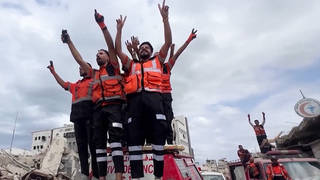
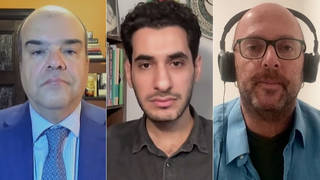
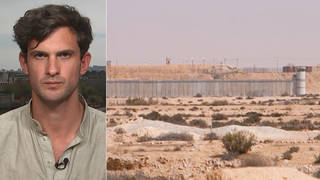
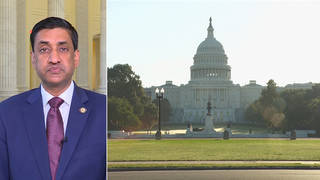






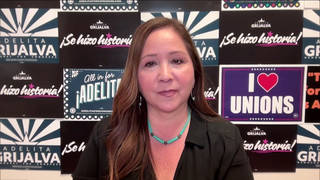
Media Options